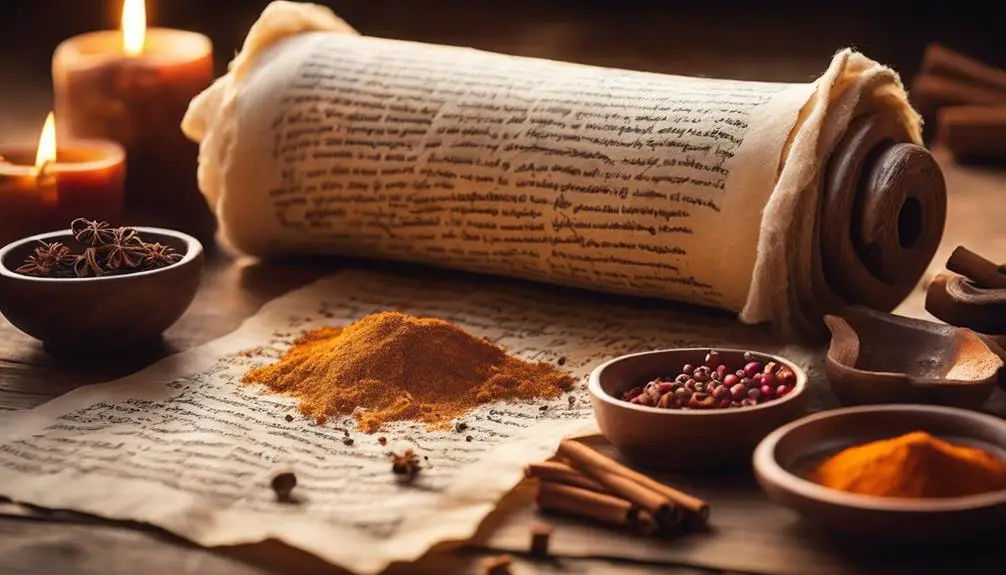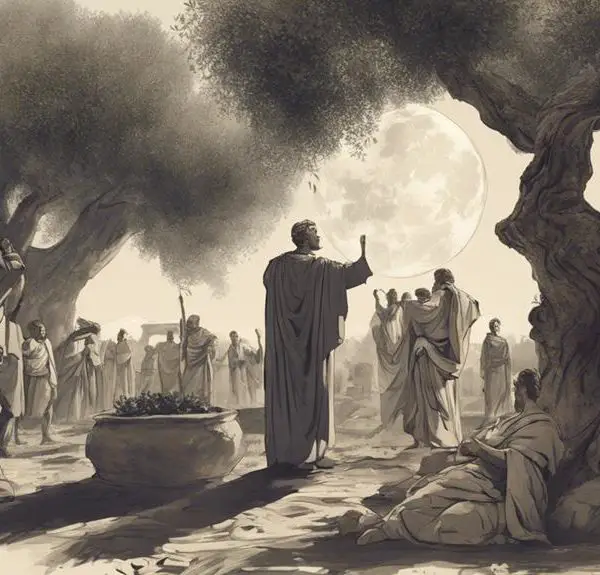Journey into the Bible's spices to uncover their hidden spiritual meanings, inviting a deeper exploration of faith and tradition.

Spiritual Meaning of Spices in the Bible
You may not be aware that the spices mentioned in the Bible carry deep spiritual meanings, transcending their culinary or aromatic uses.
For instance, frankincense isn't just a pleasant fragrance but symbolizes divine worship and the prayer of the faithful ascending to heaven.
As you explore further, you'll uncover how myrrh reflects on mortality and sacrifice, while cinnamon represents sacred anointing, setting the stage for a richer understanding of biblical texts.
This journey through the spiritual significance of spices invites you to uncover layers of meaning that will enhance your appreciation of these ancient texts, revealing insights into the values and beliefs of the times.
Key Takeaways
- Spices like frankincense and myrrh symbolize prayer, healing, and the complexities of human life in biblical texts.
- Spikenard represents deep devotion, sacrificial love, and the importance of giving one's best in relationships and to God.
- The use of spices in religious rituals emphasizes honor, spiritual purity, and the connection between the physical and spiritual realms.
- Anointing with spices such as spikenard signifies consecration, divine approval, and a special, elevated spiritual status.
Frankincense and Divine Worship

Frankincense, a resin derived from the Boswellia tree, has played a pivotal role in divine worship, symbolizing prayer and communion with the divine across various religious texts, including the Bible. Its use in sacred rituals underscores not only its spiritual significance but also its healing properties and economic value, which have been recognized since ancient times.
You'll find that frankincense's healing properties are well-documented, with ancient texts and modern research highlighting its anti-inflammatory and antimicrobial benefits. This dual function—serving both spiritual and medicinal purposes—underscores the holistic approach to wellness in biblical times, where physical healing and spiritual health were often intertwined.
Moreover, the economic value of frankincense can't be overstated. It was a highly sought-after commodity in the ancient world, fueling trade routes and contributing significantly to the wealth of civilizations. Its value was such that it was often considered worth its weight in gold, highlighting the profound importance placed on this resin not just for its spiritual symbolism but also for its tangible benefits to society.
Thus, frankincense's role in divine worship is deeply entwined with its healing properties and economic significance, reflecting a multifaceted importance that spans the spiritual, physical, and economic realms.
Myrrh: Mortality and Sacrifice

Similarly to frankincense, myrrh holds profound significance in biblical contexts, symbolizing mortality and sacrifice through its varied uses and representations. This resin, derived from the Commiphora myrrha tree, was not only valued for its aromatic qualities but also for its healing properties, playing a crucial role in ancient trade. Myrrh's bitter taste became a metaphor for the bitterness and suffering of life, particularly in the context of death and burial rites.
The use of myrrh in embalming practices underscores its association with mortality. Its antiseptic properties helped in the preservation of bodies, linking it directly to the themes of death and the afterlife. Meanwhile, the gift of myrrh to Jesus by the Magi is often interpreted as a symbol of his impending sacrifice, foreshadowing his death on the cross. This act illustrates the dual aspects of myrrh: its healing properties and its role as a symbol of sacrifice and redemption.
Aspect |
Significance |
Context |
|---|---|---|
Healing |
Antiseptic, preservation |
Ancient trade, burial |
Mortality |
Embalming, bitterness of life |
Burial rites |
Sacrifice |
Gift to Jesus, foreshadowing |
Biblical narratives |
Analyzing myrrh's role in these contexts reveals a complex symbol that intertwines life, death, and redemption, reflecting the multifaceted nature of human existence and spiritual beliefs.
Cinnamon: Sacred Anointing

Cinnamon, a spice frequently mentioned in the Bible, holds significant spiritual meaning, primarily symbolizing sanctification and divine worship through its use in sacred anointing oils. This aromatic spice, derived from the inner bark of Cinnamomum trees, was a key component in the holy anointing oil described in Exodus 30:23-25, underscoring its importance in rituals and its esteemed value in ancient cultures. The cinnamon trade, a lucrative enterprise, underscores the spice's high regard and its role in connecting various civilizations through commerce and spiritual practices.
To further understand cinnamon's symbolic significance, consider the following:
- Sacred Anointing: Cinnamon's inclusion in the holy anointing oil represents purification, setting apart objects and individuals for God's service. This act of anointing signifies consecration and divine protection.
- Spiritual and Physical Healing: Beyond its ritual use, cinnamon is celebrated for its health benefits, including anti-inflammatory and antimicrobial properties, symbolizing God's provision for both spiritual and physical well-being.
- Divine Worship Connection: The sweet aroma of cinnamon in sacred offerings enhances the sensory experience of worship, linking the physical and spiritual realms, and fostering a deeper connection with the divine.
Through its symbolic and practical applications, cinnamon serves as a reminder of sanctification, healing, and the intricate relationship between the divine and the material world.
Cassia: Purity and Humility

While cinnamon holds a place of honor for its role in sanctification and worship, cassia's significance in the Bible also emerges through its symbolic association with purity and humility. Cassia, much like cinnamon, was part of the ancient cassia trade, valued not only for its economic importance but for its profound spiritual symbolism. The aromatic uses of cassia in biblical times extend beyond mere fragrance; it represents an ethos of cleansing and a grounding in humility before the divine.
Analyzing the biblical narrative, you'll find cassia was a key ingredient in the anointing oil, prescribed for the consecration of priests and the tabernacle. This inclusion underscores cassia's role in facilitating a pure, sanctified relationship between the Israelites and God. The choice of cassia for such a sacred purpose highlights the essence of humility in worship—a reminder that true devotion is marked not by grandeur but by a sincere, humble heart.
Furthermore, the cassia trade's expansion across ancient civilizations speaks to its esteemed value, yet its biblical context prioritizes spiritual over material wealth. This dichotomy between cassia's worldly value and its application as a symbol of purity and humility offers a profound lesson on the prioritization of spiritual integrity over earthly riches.
Spikenard: Devotion and Love

Spikenard, a rare and precious ointment in biblical times, symbolizes the deep devotion and love integral to spiritual and personal relationships. This fragrance, extracted through meticulous spikenard harvesting, held a significant place in ancient rituals and ceremonies, underscoring its value in expressing unwavering commitment and affection.
To understand its profound symbolism, consider the following aspects:
- Spikenard Harvesting: The labor-intensive process of extracting oil from the spikenard plant reflects the dedication and effort required to nurture and maintain meaningful connections. Just as spikenard's value increases with the care invested in its harvesting, so does the depth of devotion in a relationship grow with attentive nurturing.
- Aromatic Uses: Spikenard was often used in anointing ceremonies, a practice that signifies honor, respect, and deep affection. Its aromatic properties were believed to purify and prepare individuals for spiritual encounters, symbolizing the sanctity and sincerity of love and devotion.
- Biblical References: Instances in the Bible where spikenard is mentioned, often in the context of worship and devotion, highlight its role as a metaphor for the selfless love and dedication that should characterize spiritual and personal bonds.
In essence, spikenard's significance extends beyond its physical properties to embody the essence of devotion and love in relationships.
Frequently Asked Questions
How Do Modern Spiritual Practices Incorporate These Biblical Spices Beyond Traditional Religious Contexts?
In modern spiritual practices, biblical spices transcend traditional religious settings. You'll find them in modern aromatherapy, where their scents are believed to heal and uplift the spirit.
They're also prominent in cultural festivals, bridging the gap between ancient rituals and contemporary celebrations. This integration demonstrates a deep, versatile appreciation of these spices, highlighting their enduring significance.
They serve as a tangible link between past traditions and present-day spiritual explorations.
Are There Any Lesser-Known Spices Mentioned in the Bible That Also Hold Significant Spiritual Symbolism?
You're likely familiar with some spices from biblical times, but there are lesser-known ones with deep spiritual symbolism. Spice cultivation and the spice trade were crucial in ancient societies, not just economically but spiritually.
How Have the Interpretations of These Spices' Spiritual Meanings Evolved Over Time Within Different Christian Denominations?
Over centuries, the interpretations of spiritual symbols have danced like flames, ever-changing and evolving.
Within different Christian denominations, this transformative journey has particularly touched upon the meanings of certain elements, leading to unique denominational rituals.
These shifts haven't been without their interpretive controversies, sparking debates and scholarly discussions.
The evolution reflects a rich tapestry of belief, each thread colored by tradition, scripture, and the ever-shifting landscape of theological thought.
Can the Spiritual Meanings of These Spices Be Connected to Similar Symbols in Other Major World Religions?
Absolutely, when you delve into cross-cultural analysis, you'll find that the symbolic convergence of spices spans across major world religions.
These connections aren't just coincidental; they're deeply rooted in shared human experiences and the universal search for meaning.
What Are the Practical Ways to Use These Spices Today to Enhance Personal Spiritual Growth or Meditation Practices?
To enhance your spiritual growth or meditation practices, consider spice gardening and exploring aromatherapy techniques.
Cultivating your own spices connects you deeply with nature's rhythms, grounding your meditation. Aromatherapy, using these spices, can elevate your spiritual experiences by creating a serene atmosphere.
This approach not only enriches your personal practice but also taps into ancient traditions of using natural elements for spiritual awakening, offering a tangible link to the wisdom of past generations.
Conclusion
In your exploration of biblical spices, you've uncovered layers of spiritual symbolism. Frankincense, myrrh, cinnamon, cassia, and spikenard aren't merely aromatic; they embody profound divine attributes. These spices serve as markers of worship, mortality, sanctity, purity, and unconditional love.
Delving deeper, the theory that these spices represent paths to spiritual enlightenment gains credibility. Analyzing their biblical context reveals a rich tapestry of meanings, inviting a deeper connection to the divine.
This journey through scripture and scent enriches understanding and faith.



Sign up